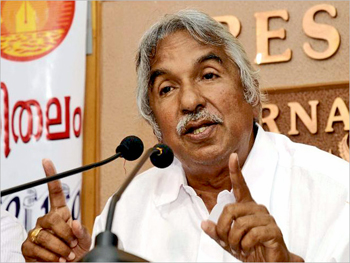New Delhi/Thiruvananthapuram, Oct 27: Kerala Chief Minister Oommen Chandy and state MP MB Rajesh have hit out at the Delhi Police for conducting a 'beef raid' at the Kerala House in the national capital.
 A day after cops visited the Kerala House after receiving a complaint from a right-wing activist that beef was being served at the canteen there, Chandy said the Delhi Police should have exercised restraint while conducting the checks.
A day after cops visited the Kerala House after receiving a complaint from a right-wing activist that beef was being served at the canteen there, Chandy said the Delhi Police should have exercised restraint while conducting the checks.
"Kerala House is a state guest house. I am yet to get complete details with regard to the incident. Whatever, Delhi Police should have shown restraint and consulted officials concerned before checking the premises for beef dishes," the Kerala CM said at a press meet in Kozhikode, as per the New Indian Express.
Chandy stated that his government will raise the matter with the Central government.
MP Rajesh demanded action against police officers who conducted the 'illegal' raid.
“How can the Delhi Police raid the Kerala House. Beef (buffalo meat) is not banned in Delhi,” Rajesh told news channel CNN-IBN.
Buffalo meat was taken off the menu at the Kerala House canteen on Monday after the Delhi Police's visit.
The Delhi Police, however, said that they visited the Kerala House and interacted with officials there after receiving the complaint from Vishnu Gupta, a Hindu Sena leader, to prevent any 'untoward incident'.
"We dealt with the matter with necessary alertness and took our position. The objective was to ensure that law and order is not disrupted," said DCP (New Delhi) Jatin Narwal.
While officials at the Kerala House argued that they served only buffalo meat at their canteen, yet they still decided to take it off the menu.





Comments
Add new comment